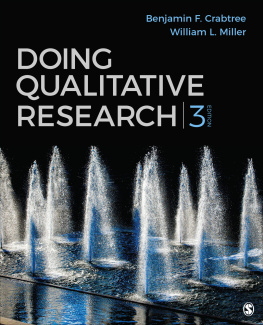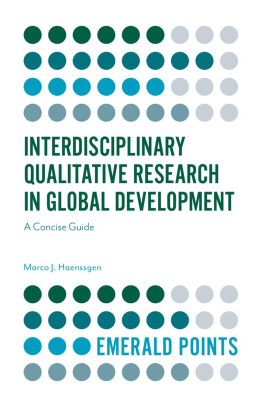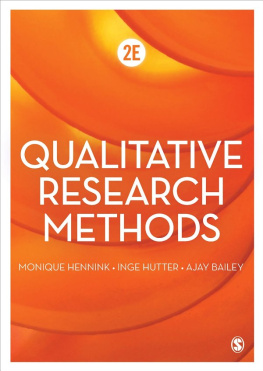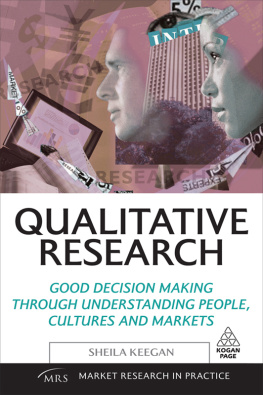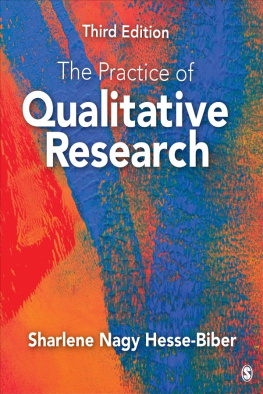
Praise for the book
This book is a practical and informative addition to the existing text books on qualitative methods. The authors show the scope of qualitative research and the value of the approach to international development. Having a foot in both academia and development has enabled them to produce a valuable guide which addresses many of the questions raised by development organizations about how you do qualitative research, analyse and write up. I am delighted to see this valuable book!
Janet Seeley, Professor of Anthropology and Health, London School of Hygiene & Tropical Medicine
Is there a need for yet another textbook on qualitative methods? At first sight, perhaps not, but after having read this volume there are good reasons to rethink that gut response. The debate between qualitative and quantitative methods is old and might be coming to an end. The understanding and lack of understanding of qualitative methods varies over time, and hence each period of time needs its own explanation of qualitative methods. The current volume sets the discussion squarely in current discussions around evidence, learning, rigour and performance management. While it is mainly directed at practitioners of qualitative research, I hope many others study its contents: project and programme managers, those who take decisions on the design and funding of research and evaluation, and in particular all who use research findings and who have opinions on whether a particular research process can be considered as rigorous evidence.
Kim Forss, Swedish Expert Committee on Aid Analysis and Evaluation

Practical Action Publishing Ltd
The Schumacher Centre,
Bourton on Dunsmore, Rugby,
Warwickshire, CV23 9QZ, UK
www.practicalactionpublishing.org
Save the Children Fund, 2015
The right of the authors to be identified as authors of this work has been asserted under sections 77 and 78 of the Copyright Designs and Patents Act 1988.
All rights reserved. No part of this publication may be reprinted or reproduced or utilized in any form or by any electronic, mechanical, or other means, now known or hereafter invented, including photocopying and recording, or in any information storage or retrieval system, without the written permission of the publishers.
Product or corporate names may be trademarks or registered trademarks, and are used only for identification and explanation without intent to infringe.
A catalogue record for this book is available from the British Library.
A catalogue record for this book has been requested from the Library of Congress.
ISBN 9781853398537 Hardback
ISBN 9781853398544 Paperback
ISBN 9781780448534 Library Ebook
ISBN 9781780448541 Ebook
Citation: Skovdal, M., and Cornish, F., (2015) Qualitative Research for Development, Rugby, UK: Practical Action Publishing,
Since 1974, Practical Action Publishing has published and disseminated books and information in support of international development work throughout the world. Practical Action Publishing is a trading name of Practical Action Publishing Ltd (Company Reg. No. 1159018), the wholly owned publishing company of Practical Action. Practical Action Publishing trades only in support of its parent charity objectives and any profits are covenanted back to Practical Action (Charity Reg. No. 247257, Group VAT Registration No. 880 9924 76).
The views and opinions in this publication are those of the authors and do not represent those of Practical Action Publishing Ltd or its parent charity Practical Action. Reasonable efforts have been made to publish reliable data and information, but the authors and publisher cannot assume responsibility for the validity of all materials or for the consequences of their use.
Cover design by Mercer Design
Typeset by Allzone Digital Services
Printed by Hobbs the Printers, UK
Contents
Figures
Tables
Boxes
Activities
Morten Skovdal (PhD from London School of Economics and Political Science) is Associate Professor in the Department of Public Health at the University of Copenhagen, where he teaches qualitative research methods. He has 10 years of experience in conducting qualitative research in the field of development and global health. Before joining the University of Copenhagen, Morten worked as a Senior Advisor on Impact and Evidence at Save the Children UK. He is also a founding trustee of a UK trust supporting child welfare programmes in Kenya.
Flora Cornish (PhD from London School of Economics and Political Science) is Associate Professor in the Department of Methodology at the London School of Economics and Political Science, where she teaches qualitative research methods. She has 15 years of experience in conducting qualitative research in collaboration with small local NGOs, government health services, and large international charities.
Morten and Flora collectively have 25 years of experience in conducting qualitative research with development organizations. They have published over 140 academic articles, using qualitative methods to better understand health and development.
This book has grown out of our collective work on qualitative research in the context of development and global health over the past 15 years. During this time, we have had a foot in both academia and international development organizations, and have collaborated with many local NGOs. We feel extremely fortunate to have been able to combine our training as qualitative researchers and academics with people-centred development. Our research focuses on giving voice to some of the most marginalized members of society, highlighting injustices and opportunities for participatory decision making in the practice of development, social work, and global public health. But our engagement with development practitioners has also been challenging at times. This book is a culmination of some of the rich and challenging discussions we have had with colleagues working for development agencies. They kept us on our toes, and forced us to continually re-think and re-work our academic and qualitative research practice to fit with the realities and interests of development agencies. Nonetheless, our engagement and discussions spotlighted confusion and lack of clarity within development organizations pertaining to what qualitative inquiries are good for in the context of development, and when they are good enough to constitute qualitative evidence. We see this lack of clarity as a key obstacle to a more widespread application of qualitative research methods in the context of humanitarian responses and development programmes.
For a long time we struggled to explain what qualitative research is good for in the context of international development work. This may seem a bit odd given our qualitative research experience. However, we quickly learned that it was not merely a matter of explaining what qualitative research is about and what it can be used for. We also learned that this was not a matter of convincing quantitatively trained monitoring and evaluation staff about what qualitative research can do. In fact, most of them know that qualitative research is about giving people a chance to communicate their perspectives in order to gain a more in-depth understanding of an issue. Instead, it became a matter of highlighting and identifying how qualitative research can feed into development practitioners everyday work practice and support their efforts to develop impactful development programmes that reach a greater number of people with quality services. In other words, it became a matter of showcasing exactly how qualitative research can contribute in a concrete way to organizational targets, humanitarian responses, and development programmes. With support from a great number of colleagues working in the field of development, we hope that this book provides some pointers as to what qualitative research can do in a concrete way for development practice.


